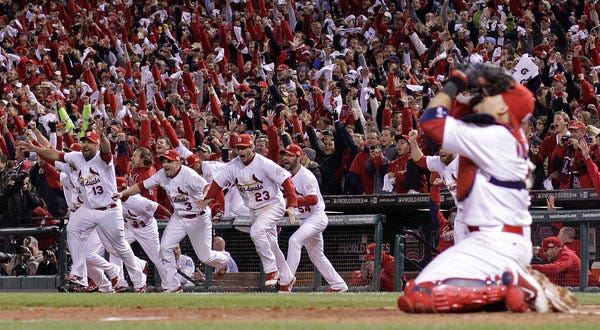Luck, Randomness, and Success
We don’t get hot, we get lucky. Realize randomness and chance influence us. Find what is repeatable and ignore what isn’t.
On August 24th, 2011, the St. Louis Cardinals sat ten games behind the Milwaukee Brewers in the divisional standings and 10.5 games behind the Atlanta Braves in the Wild Card Standings. The wild card is for teams not winning their division but trying to qualify for the playoffs. The team was unraveling and needed a quick solution with 32 games remaining.
They called a players-only meeting with their playoff odds at 1.3%. It did something. They won six of their next seven games, improving their playoff chances to 4.3%.
While the Cardinals were improving, the Atlanta Braves were struggling. After August 24th, the Braves won six of their next 13 games before facing the Cardinals in a crucial three-game series. The Cardinals eked out consecutive one-run wins and won the third game to complete the sweep. The Braves’ 10.5 game lead shrunk to 4.5 games with 16 games left. St. Louis's playoff chances sat at 7.7% despite their recent fortune. Slowly they got back on track, but would they run out of time? With nine games left, their playoff chances inched up to 17.7%.
The Cardinals finished with 23 wins over their last 32 games but the comeback to make the playoffs came down to the final game. They needed a Braves loss. The Braves blew a ninth-inning lead and sent the Cardinals to the playoffs. It culminated in a terrible end for the Braves. They lost 18 of their final 27 games allowing the Cardinals to erase a 10.5 game deficit in 32 games–a historic comeback from the Cardinals and a famous collapse from the Braves.
The Cardinals were hot, but it wouldn’t have mattered without the Braves collapse. It took luck and randomness. It required uncontrollable forces. Remember, the Cardinals were ten games behind the Brewers and 10.5 games behind the Braves. The Cardinals couldn’t catch the Brewers, despite how well they played, because the Brewers didn’t collapse.
In the first round of the playoffs, the Cardinals faced the heavily favored Philadelphia Phillies, who finished with the best record in the MLB, in a five-game series. The Cardinals defeated the Phillies behind two one-run wins, overcame a four-run deficit, overcame a two-run deficit, and won a winner-take-all game 1-0. In the next round, they defeated the Milwaukee Brewers to advance to the World Series against the Texas Rangers.
Their luck had seemingly run out in the bottom of the ninth of Game 6 of the World Series. Down to the last strike facing a 7-5 deficit with two runners on, the story writes itself. David Freese hit a game-tying triple to send the game into extra innings. The Rangers scored to lead 9-7 in the tenth inning and got the Cardinals down to their last strike again! The Cardinals refused to die, a team of destiny it seemed. They defied the odds, tied the game, and sent it to the 11th inning. The Rangers couldn’t break the tie, and in the bottom of the 11th, David Freese magic struck again. He hit a game-winning home run to force a winner take all Game 7.
The Cardinals set two records in their Game 6 win:
The first team to overcome deficits in the 9th and 10th innings. In both innings, they were down to their last strike.
The first team to score in the 8th, 9th, 10th, and 11th innings.
It was their year. They would win Game 7 and become World Series Champions.
It was a historic run. The Cardinals almost died many times, got hot, and danced their way to a championship. However, it required more than the Cardinals getting hot. It required luck.
The Cardinals needed a historic collapse by the Braves that relied on the final game of the regular season. They survived two one-run wins in the first round of the playoffs while erasing big deficits. They needed the Rangers to give up the tying run on their last strike twice. Not to mention, the luck to squeak by in the regular season. They weren’t hot, they were lucky.
Randomness, chance, and luck influence us more than we realize. Success requires luck and variance.
Randomness is timing. The Cardinals got “hot” right as the Braves were getting “cold”. No one wants to accept the randomness of their successes. The Cardinals saw themselves as the team of destiny. The Braves were happy to chalk it up to being unlucky. Randomness affected both sides. Randomness influences successes and failures no matter how much we think our successes are a product of our skills. The Cardinals’ path isn’t repeatable.
The key is repetitiveness. We want to learn about a repeatable lesson in investing, business, athletics, and life. Having a players-only meeting to get your team back on track? Repeatable. Erasing a historic deficit over the last 30 games aided by a historic collapse from another team? Non-repeatable. Most things are not repeatable. Understanding what is and isn't repeatable is important because you begin to differentiate and implement the repeatable lessons into your life.
Much can be learned from the 2020 market crash, but you can’t replicate a v-shaped recovery. Much can be learned from Jeff Bezos on building a business, but you can’t mirror the growth of the internet he experienced while building Amazon. Much can be learned from Rivian, but you can’t duplicate the EV market during their IPO. The 2011 St. Louis Cardinals offer lessons on how to rally together and save a season, but you can’t replicate an abysmal collapse by an opponent.
Understand we don’t get hot, we get lucky. Realize randomness and chance influence us. Find what is repeatable and ignore what isn’t.
-Scantron
Appreciate you reading.


